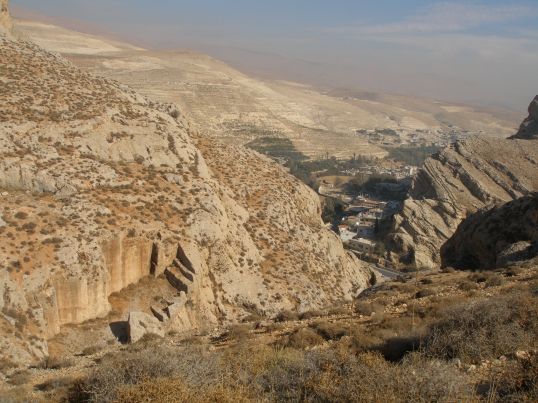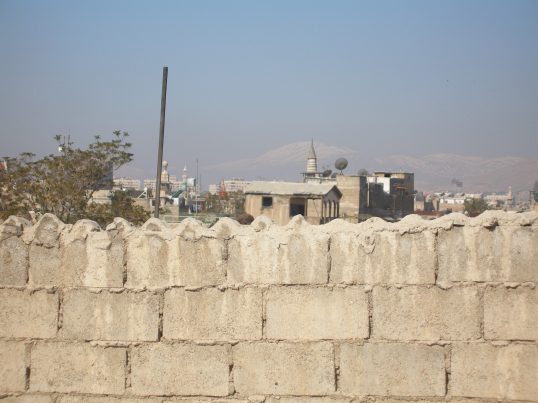Syria conflict – the biblical river at the heart of the Damascus water war

The Roman aqueduct system is still visible in the cliffs of the Wadi Barada gorge (2011, DD)
The flashpoint for Syria’s war, six years old this March, took the form in recent weeks of an elemental struggle over water. Drinking water to some 5 million residents in the Syrian capital Damascus was cut on 23 December by the Damascus Water Authority, blaming diesel contamination of the supply by the rebels.
The historic water source of Ain al-Fijeh lies in a valley 18km northwest of the capital in Wadi Barada, where a cluster of 13 villages has been under rebel control since 2012. Local people joined the revolution early in protest against government neglect, corruption and land grabs made legal under new state land measures, where whole hillsides were requisitioned for sports clubs and luxury hotels.

The hillsides of Wadi Barada, with a Roman quarry in the bottom left (2011, DD)
On 22 December the Assad government, using barrel bombs dropped from helicopters and supported on the ground by Lebanese Shi’a militia fighters of Hezbollah, began a campaign to take control of the strategic valley and springs. The timing was significant, just days before the announcement of the countrywide ceasefire brokered by Russia and Turkey on 29 December.
The Barada Gorge was cut through the Anti-Lebanon Mountains geological eons ago by the Barada river, which still runs through the centre of Damascus. Today it is just a shadow of its former self, diminished for most of the year by drought and pollution to a dirty trickle by the time it reaches the city-centre. But in earlier times it was the source of the city’s legendary fertility, and the reason for its location in an oasis of gardens and orchards known as the Ghouta. The river was and still is fed by the melt waters of Mount Hermon, Syria’s highest peak. Mentioned no less than 15 times in the Bible, it retains its snow-capped summit till early June. The amount of snowfall in winter is a direct indication of how much water Damascus will have throughout the year.

The distant snows of Mt Hermon, seen from Damascus rooftops (2011, DD)
The Barada, the ancient Abana, was supplemented through seven further rivers whose course was diverted by means of elaborate channels as far back as Roman times. Guided by aqueducts into the centre of Damascus, the city was fed by a complex network of waterways and channels that allowed water to flow in and out of every house. Sophisticated Ottoman water distribution points throughout the city also allocated water in agreed quantities to the public bathhouses, mosque ablution areas and public drinking fountains. Even today most houses have a special drinking tap in their kitchen directly connected to the spring.
In high summer families would come to Wadi Barada on Fridays and holidays, often renting a riverside platform for the day. Rigged up as tent awnings open only onto the river side, they formed an idyllic private arbour where families could relax, enjoying the coolness of the fast-flowing river. Little iron ladders were fixed onto the platforms, so that children could climb down and swim.

A swimming platform and ladder used by picnicing families along the river (2011, DD)
In the 16th century it was along the banks of the Barada river on the outskirts of Damascus that the first coffee houses grew up. Pilgrims would be assembling, waiting for the annual Hajj or pilgrimage to Mecca to set off in one huge joint caravan, protection in numbers from raiding desert tribesmen. Many engravings from the 19th century show scenes of coffee houses on the banks of the brimming Barada.
Near the village of Souq Wadi Barada, huge gaping holes in the cliff above can be still be scrambled into. They are part of the original Roman water system, elaborate tunnels cut into the rock conducting the melt-waters into the aqueducts of Damascus.

Wadi Barada’s ancient Roman aqueduct system, cut into the cliff, to guide water from Ain Fijeh to Damascus (2011, DD)
Sections of the old Roman road between Baalbek and Damascus, inscriptions in Greek, the official language, and in Latin, the language of the soldiers, can still be seen, describing how the road was rebuilt higher up to avoid destruction by flooding.

A Latin inscription above the Roman road in Wadi Barada connecting Damascus to Baalbek (2011, DD)
For Hezbollah too the battle is a geographical one. They regard this area as their backyard, connected to their Baalbek stronghold in Lebanon. They have been determined to take it, along with the Qalamoun Mountains a little further north, to ensure total control of this area which they see as vital to their and their sponsor Iran’s strategic interests, part of their Shi’a Crescent linking Tehran to the Mediterranean.
The Syrian government claimed there were fighters from the Al-Qaeda-linked Jabhat Fatah al-Sham (formerly Jabhat al-Nusra) present in Wadi Barada, to justify its ongoing campaign, since that group was excluded from the countrywide ceasefire. Local residents have always insisted there were only ever Free Syrian Army moderates present in the valley.
After two attempts at local ceasefires failed and the key mediator was killed in a targeted assassination, the battle continued for a month, till the Syrian regime and its Hezbollah ally shelled the valley into submission. Under a deal, some fighters were permitted to leave for rebel-held Idlib province in the north. Others were permitted to stay if they agreed to join Assad’s army. Russian media says the repairs to the Ain Fijeh water source are nearly complete and Damascus’s drinking water will soon be restored after nearly eight weeks of shortages where the residents had to use wells or bottled water.

Syrian soldiers reclaiming the source of the spring at Ain Fijeh, Wadi Barada 29 January 2017 (Sputnik News)
Each side continues to blame the other.
Since both UN monitors and Russian officials were denied access to the area by Hezbollah checkpoints, the truth remains hidden – as so often in Syria – behind the fog of war, or in this case, beneath the waters of the Barada.
This article is an updated version of this BBC feature which first appeared on 8 January 2017 http://www.bbc.co.uk/news/world-middle-east-38532338
On 14 March 2017 the UN published a report confirming that the Ain al-Fijeh spring was deliberately bombed by the Syrian air force:
http://www.bbc.co.uk/news/world-middle-east-39266213
Other related articles:
http://www.bbc.co.uk/news/world-middle-east-38782935
https://www.bellingcat.com/news/mena/2017/01/04/wadi-barada-happened-damascuss-water/
http://www.aljazeera.com/news/2017/01/syrian-army-captures-wadi-barada-170129131830656.html
https://sputniknews.com/middleeast/201702071050429093-wadi-barada-damascus-water-supply/
Dear Ms Darke
Very interesting thanks for your article. I lived in Damascus for 2 years 2008 to end 2009 so I missed the troubles, I still have friends their and also some who have escaped as refugees.
Thanks again
G lippitt
Dear Geoffrey
Many thanks for taking the trouble to comment, and I’m glad you found the article interesting. It was a very under-reported story in my view, as I sense the West is suffering from Syria fatigue and indeed, refugee fatigue, sadly. Makes me ashamed to be British. Good for you, keeping in touch with your friends – they will really appreciate it.
All best wishes
Diana
Hello Diana – Apologies – a senior moment I’m afraid – I booked and paid to attend the presentation at the Huddersfield Literature Festival last night but I forgot about it – bogged down with a book I am writing and my brass band radio programme preparation.
Is a similar thing going to be held anywhere else?
Regards
Chris Helme
Hello Chris, That’s a shame, sorry you missed the event. I’ve added a Contact email on my website now, and you’ll also see an Events section which shows all upcoming events, in case you can make it to one of those. I hope so.
With best wishes
Diana
Hi Diana
I am writing a fictional book in relation to the Syrian war. I would like to interview you for the project. I have a few questions concerning writing and the Syrian Civil War. If you could get back to me ASAP, it would be awesome.
Thank You
Eman Salem